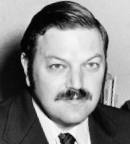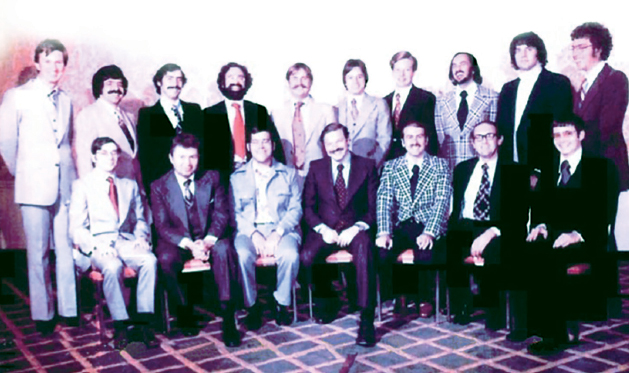
Stephen K. Carter, MD (1974) Source: National Cancer Institute
Stephen K. Carter, MD, a renowned oncologist who held a variety of executive positions in the pharmaceutical industry and played a major role in the research and development of many widely used cancer and AIDS drugs, died on November 14, 2016, after a long battle against multiple systems atrophy. He was 79. Steve’s passing marks the end of an era: He was inspirational to a generation of oncologists—some of whom are identified in the photo shown of our small Cancer Therapy Evaluation Program (CTEP) reunion prior to the 1976 ASCO Annual Meeting.
Historical Look at CTEP
In the spring of 1976, at the ASCO Annual Meeting in Toronto, those of us connected with the Cancer Therapy Evaluation Program of the National Cancer Institute (NCI) came together for a farewell party to Steve, as he was leaving for Stanford University after an impressive 10-year span at the NCI, where he rose to be CTEP’s Director and Deputy Director of the Division of Cancer Treatment. In this May 1976 “roast,” he was given the keys to a room in the Bethesda Ramada Inn, with the expectation of future trips back to the NCI campus.
CTEP’s mission, in fact, was forged by Steve Carter’s enthusiasm and organizational skills in canvassing NCI resources toward coordinated efforts in clinical drug development, at a time when the pharmaceutical industry was not prominently involved in clinical trials. Steve was quick to recognize that a critical analysis of clinical studies and introduction of new drugs and new modalities were essential in making advances in cancer treatment.
As NCI’s chemotherapy program evolved into a Division of Cancer Treatment, Gordon Zubrod identified Steve as CTEP’s leader of two branches: the investigational drug branch (overseeing clinical studies of new drugs in the NCI pipeline) and the combined-modality branch (stimulating contract-supported clinical trials—in 1975, the latter was merged into a clinical investigations branch, including oversight of grant-supported cooperative groups). For nearly a decade, Steve functioned as Gordon’s (and later Vince DeVita’s) right hand for extramural clinical trials, setting up mechanisms to pursue hot leads (such as early platinum development in testicular and gynecologic cancers) or expanding beyond single-agent chemotherapy studies (such as adding drugs to radiation therapy in gastrointestinal cancers or pediatric solid tumors).
Single Agents in Cancer Chemotherapy, written by Robert B. Livingston and Steve and published in 1970, exemplifies these efforts: It was a handy reference for clinical investigators during the early years of chemotherapy for solid tumors. The preamble, written by Gordon Zubrod, states: “While the most important of these (antitumor drug studies) have been published, there remained a wealth of data not generally available to the scientific community.” It ends with the statement: “Their monumental work has provided not only access to the hard data, it has also shown the need for research to fill in important gaps in our knowledge.” Gordon Zubrod was not known to use superlatives, and describing their work as “monumental” speaks volumes.
Dynamic Figure in Global Oncology
Steve Carter became a prominent and dynamic figure in the global development of cancer chemotherapy, responsible for opening doors to young clinical investigators in the international arena. He capably represented the NCI and U.S. oncologic activities in various international collaborative exchanges: with Italy via collaboration with the Cancer Institute in Milan (particularly through Gianni Bonadonna), with Japan and the NCI liaison office in Tokyo (with Yoshio Sakurai and Shigheru Tsukagoshi), including valuable antibiotic development contacts with the Institute of Microbial Chemistry (Hamao Umezawa) and the Japanese Society for the Promotion of Science; with the former Soviet Union and preclinical as well as clinical trial exchanges in chemotherapy (with Natalia Perevodchikova in Moscow and Michael Gershanovich in Leningrad—now St. Petersburg); and last—but not least—through the NCI liaison office in Brussels led by Omar Yoder, building dynamic interactions with the European Organisation for Research and Treatment of Cancer (EORTC) and its leaders Henri Tagnon (Brussels), Georges Mathe (Villejuif), and Franco Cavalli (Bellinzona).
Key Role in Drug Development
In 1985, after serving at the NCI and 6 years at the helm of Northern California’s Cancer Program and Professor at Stanford, Steve joined Bristol-Myers—in 1989 renamed Bristol-Myers Squibb—in charge of oncology and HIV drugs. In this new role, he was instrumental in developing drugs to increase the armamentarium against cancer and AIDS and mentoring many junior colleagues. He maintained this role until stepping down in the late 1990s, while continuing to work as a consultant for emerging pharmaceutical development programs.
Steve Carter became a prominent and dynamic figure in the global development of cancer chemotherapy, responsible for opening doors to young clinical investigators in the international arena.— Ronald Blum, MD, Marcel Rozencweig, MD, and Franco Muggia, MD
Tweet this quote
Featured at the plenary session of the 1976 ASCO Annual Meeting was Larry Einhorn’s classic paper on cisplatin, vinblastine, and bleomycin in testicular cancer, which emanated from the clinical development of cisplatin. In 2003, at a New York University gathering on platinums honoring Barnett Rosenberg and his discovery of cisplatin as an anticancer drug, Steve reminisced: “Your persistence in calling me every week to ask me ‘how is my drug doing?’ certainly helped move it along our NCI pipeline.”
Accomplishments and Interests
Steve received his BA in American history from Columbia University and his MD from New York Medical College in 1963. He completed his medical internship and residency at Lenox Hill Hospital in New York, where he became Chief Medical Resident. He went on to publish numerous papers and books on cancer treatment. In addition to his various positions in the pharmaceutical industry, in 1994, President Clinton named Steve to an 18-member panel of scientists, physicians, and advocates for patients with AIDS to help speed the search for new drugs to combat the virus that causes AIDS.
Steve had a lifelong passion for opera, classical music, and the theater. Not surprising, he had the most complete collection of tapes, LPs, and CDs you could imagine, and all very carefully curated. Steve stimulated colleagues’ interest in opera, certainly mine (RB).
Steve was a voluminous reader, world traveler, political junkie, and dedicated sports fan. He will be remembered most of all as a generous, loving husband, father, and grandfather.
Tribute From Colleague

CTEP Reunion, 1976. Front row, left to right: Michael Goldsmith, Milan Slavic, Todd Wasserman, Stephen Carter, John Penta, Franco Muggia (Steve’s successor at CTEP), and Dan Von Hoff. Standing, left to right: Robert Livingston (Steve’s “first fellow,” who predeceased him: In Memoriam, The ASCO Post, September 23, 2016); Robert Comis, Marcel Rozencweig, Michael Friedman, Bill Hrushevsky, Alan Keller, Paul Vilk, Sewa Legha, Gary Strauss, and Ron Blum.
Learning of Steve’s death, James Holland reflected upon his NCI accomplishments: “Steve was one of the most important clinical leaders of the NCI in its glory days under Gordon Zubrod. He mentored many who later became leaders and was a paragon of literature review. Usually, his mentee became the first author, but if Steve’s name was on it, we could all trust that it was an exhaustive and critical analysis of the relevant literature. For older oncologists outside the NCI like Tom Frei and myself, he was a bedrock of information and a generous and helpful colleague. Medical oncology owes him great respect and gratitude. There has been no one like him since.” ■

